


President Donald Trump told reporters in the Oval Office that he has "sort of made a decision" concerning the ultra-controversial question of selling and transferring long-range Tomahawk missiles to Ukraine, via intermediary countries in NATO.
But then he added the crucial caveat that he first wants to know what the Ukrainians plan to do with the Tomahawks. "Where they are sending them, I guess I will have to ask that question. I would ask some questions," he posed.
This suggests a cautious approach which will lean against such a brazen escalation in the conflict. Moscow last week said it would be "surprised" if the Trump White House actually went through with this.
"I sort of made a decision pretty much," Trump said when asked by reporters whether he has made a final decision. The following additional response is bad news for hawks, and positive for doves which wish to see de-escalation of the proxy war:
"Where they are sending them, I guess I will have to ask that question. I would ask some questions. I am not looking to see an escalation," Trump said.
Some pundits are interpreting this as a 'yes' - but it's clear that Trump did not give approval - based on these remarks alone at least.
The response came after Russia's President Putin on Sunday said that the supply of Tomahawks to Ukraine would be a "completely new, qualitatively new stage of escalation."
But Ukraine's Zelensky has argued just the mere possession of such sophisticated, long-range capabilities would force Putin to the negotiating table.
And yet, even with just long-range drones the Ukrainians are seeking to hit targets in and around Moscow. Trump knows using Tomahawks on Moscow would be a sure path toward WW3.
Russia is still seeking from a firm 'no' on the matter, as Reuters reports Monday:
Russia said on Tuesday it was waiting for clarity from the United States about the possible supply of Tomahawk missiles to Ukraine, saying such weapons could theoretically carry nuclear warheads.
Trump has shown real concern for improving bilateral relations with Moscow amid all the tension, also as the key nuclear treaty New START is hanging by a thread, having been extended by one year as negotiations proceed.
The American president knows that suddenly supplying a system such as Tomahawks would likely destroy all last vestiges of positive, diplomatic dialogue with Moscow. But this is a leader who has at times has undergone radical changes of mind, and it is sometimes difficult to interpret his thinking.
